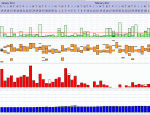Woodworker, I could be wrong but I would bet that you were until recently getting your closed captioning through your set-top box, probably a cable company box, and not through your TV. All well and good, except one of the main rewards to the public of switching from analog to digital TV transmission was that it eliminated the need for cable TV services in most metropolitan areas, giving you a crystal-clear TV picture with a small $50 UHF antenna.woodworkerjunkie wrote:I'm sorry Nate, I did numerous searches to find what you were talking about, and found "none"! Maybe I'm not understanding what you are trying to say. When, the conversion was made, I owned both digital and analog tv sets. I didn't get the conversion box for my analog tv's, so I cant say. Now, on my digital tv, anytime I hit the mute button, it automatically starts CC at the bottom of the screen. I never saw a break in CC after the conversion, on my digital set! Maybe you could point me to a few websites to explain the problem that you were having?Another great right-wing oversimplification. To those of us with a hearing deficit, a minority of the population but one with equal ownership of the public airways, grossly inadequate regulation of the TV industry during the Bush years resulted in our losing our previously established closed captioning on broadcast TV, because the industry slipped through the loophole that the prior requirement of CC supposedly didn't apply after the switchover to digital transmission. The technology was already common knowledge and it would have cost only a few cents for the industry to have included CC capability in digital sets, but the industry shrugged that, since the federal regulations had not been extended to digital, why should they include it! For several years, we lost a previous capability we had and relied on, while the industry delayed the extension of the CC requirement to digital as long as they could. Only now are we getting back what they took away, and it took new regulations to get them to do it!
Nate
Oh, I added the clip below to show you who enacted the law to require companies to start manufacturing tv's with the chips in them to decode CC. The article was even written by a "Left Winger"! I'll have to give him credit though, at least he acknowledged that it was a Republican that enacted the law!
As far as analog tv's during the switch, they required a converter box to allow it to receive the digital signal. The CC decoder was built inside these converter boxes! There were rebates offered on these conversion boxes that would make them either free or of little cost to anyone who had analog tv's!Well, closed-captioning itself is far more widespread. George Bush – a Republican president, no less – enacted a law requiring that caption-decoder chips be built into nearly all U.S. televisions after mid-1993. No more than 300,000 set-top decoders had ever been sold in the entire prehistory of closed captioning; suddenly more than 20 million decoder-equipped TV sets were added each year, making captioning a fixture in hearing people’s lives, too.
*http://joeclark.org/design/print/readingthetube.html
- You are concerned how the switch will affect closed captioning.
FCC rules require that all digital-to-analog converter boxes pass
through closed captioning automatically. In addition, many
converter boxes will generate captions through the converter box
itself, thus enabling you to change the way your captions look. If
you have a digital TV, you’ll enjoy better visibility and ease of use.
http://www.wsiu.org/media/TV/dtv/WSIU_DTV_Switch.pdf
Like many of the folks in our neighborhood, we dumped the cable TV box soon after digital OTA TV, and get all the TV we can consume over-the-air or through the hundreds of channels on our $80 Roku box. To get the advanced picture, we use HDMI on our HDTV. With analog TV, CC was built into the TV set. With digital, it was only being built into the set-top box from the cable company, and not into the TV, thus leaving you at the mercy of the cable TV operators, even in metropolitan areas where the digital OTA signals are strong enough and diverse enough to give you loads of options without paying a cable company. HDMI would not pass CC.
That's the explanation we were given.
I will be happy to be corrected on this, but at the time we lost CC after getting an HDTV, I went to numerous websites for the hearing impaired, and all forum members reported being in the same boat, and being stuck there, until after the last, recent stages of the implementation of the law known as the "Twenty-First Century Communications and Video Accessibility Act of 2010."
Regards,
Nate




















